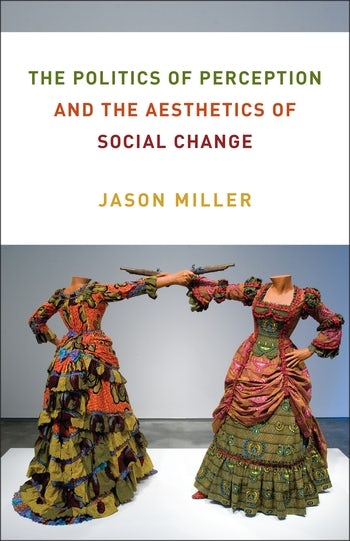The Politics of Perception and the Aesthetics of Social Change
Columbia University Press

The Politics of Perception and the Aesthetics of Social Change
Columbia University Press
In both politics and art in recent decades, there has been a dramatic shift in emphasis on representation of identity. Liberal ideals of universality and individuality have given way to a concern with the visibility and recognition of underrepresented groups. Modernist and postmodernist celebrations of disruption and subversion have been challenged by the view that representation is integral to social change. Despite this convergence, neither political nor aesthetic theory has given much attention to the increasingly central role of art in debates and struggles over cultural identity in the public sphere.
Connecting Hegelian aesthetics with contemporary cultural politics, Jason Miller argues that both the aesthetic and political value of art are found in the reflexive self-awareness that artistic representation enables. The significance of art in modern life is that it shows us both the particular element in humanity as well as the human element in particularity. Just as Hegel asks us to acknowledge how different historical and cultural contexts produce radically different experiences of art, identity-based art calls on its audiences to situate themselves in relation to perspectives and experiences potentially quite remote—or even inaccessible—from their own. Miller offers a timely response to questions such as: How does contemporary art’s politics of perception contest liberal notions of deliberative politics? How does the cultural identity of the artist relate to the representations of cultural identity in their work? How do we understand and evaluate identity-based art aesthetically?
Discussing a wide range of works of art and popular culture—from Antigone to Do the Right Thing and The Wire—this book develops a new conceptual framework for understanding the representation of cultural identity that affirms art’s capacity to effect social change.
Connecting Hegelian aesthetics with contemporary cultural politics, Jason Miller argues that both the aesthetic and political value of art are found in the reflexive self-awareness that artistic representation enables. The significance of art in modern life is that it shows us both the particular element in humanity as well as the human element in particularity. Just as Hegel asks us to acknowledge how different historical and cultural contexts produce radically different experiences of art, identity-based art calls on its audiences to situate themselves in relation to perspectives and experiences potentially quite remote—or even inaccessible—from their own. Miller offers a timely response to questions such as: How does contemporary art’s politics of perception contest liberal notions of deliberative politics? How does the cultural identity of the artist relate to the representations of cultural identity in their work? How do we understand and evaluate identity-based art aesthetically?
Discussing a wide range of works of art and popular culture—from Antigone to Do the Right Thing and The Wire—this book develops a new conceptual framework for understanding the representation of cultural identity that affirms art’s capacity to effect social change.
Reaching from Kara Walker to Kant, from Public Enemy to William Pope.L, this engagement with the contemporary cultural turn could not be timelier. This book is indispensable for anyone interested in the way representation, recognition, identity, and agency both resonate and intertwine in art and politics. What a valuable contribution! Paul C. Taylor, W. Alton Jones Professor of Philosophy and Professor of African American and Diaspora Studies, Vanderbilt University
By expressing human subjectivity in its distributed shapes, art can work both to bind us together in our differences and to help us to embrace our concrete individualities. Jason Miller's compelling account of the powers of art is vitally important for healthy democratic and personal life in contentious and uncertain times. Richard Eldridge, Charles and Harriett Cox McDowell Professor Emeritus of Philosophy, Swarthmore College
Jason Miller's The Politics of Perception and the Aesthetics of Social Change makes a decisive contribution to current debates in both contemporary philosophy and art theory regarding the interconnection between aesthetic and political experience. In particular, he challenges the often-static notions of aesthetic autonomy that have been associated with the discourse of the neo-avant-garde over the past three decades. Instead of an aesthetic paradigm predicated on a hierarchical division between art and popular culture, and between the artist and public, Miller deftly explores the complex points of dialogical interconnection between them through a self-reflective, materialist account of the nature of identity inspired by Hegel's aesthetics. His book demonstrates the essential role that art, and culture more generally, can play in re-thinking the crucial relationship between the self and the other, and the one and the many. It is sure to be of interest to readers across a broad range of disciplines, especially contemporary art history and theory. Grant Kester, author of The One and the Many: Contemporary Collaborative Art in a Global Context
Jason Miller's topic is important and timely: it is clearly important that art helps reveal our identities to each other so that we can obtain self-determination, gain an understanding of our common humanity, and apprehend each other's worth. His main contribution consists in doing what he feels contemporary aesthetic and political theory have failed to show sufficiently: to make us conscious of how art uses aesthetic representation to gain recognition and greater power for the cultural and individual identity of the marginalized. Fred Evans, author of Public Art and the Fragility of Democracy: An Essay in Political Aesthetics
Acknowledgments
1. The Cultural Turn
2. Rethinking the Claims of Culture: “Offensiveness” in the Rushdie Affair and Beyond
3. Imagining Agency: Self-Determination and the Experi-ence of Art
4. The Aesthetics of Recognition
5. Imagination and Interpretation After the “End of Art”
Notes
Bibliography
Index
1. The Cultural Turn
2. Rethinking the Claims of Culture: “Offensiveness” in the Rushdie Affair and Beyond
3. Imagining Agency: Self-Determination and the Experi-ence of Art
4. The Aesthetics of Recognition
5. Imagination and Interpretation After the “End of Art”
Notes
Bibliography
Index
